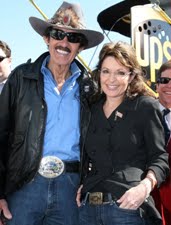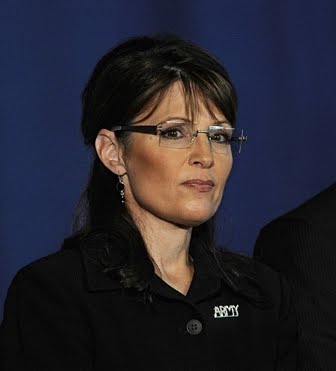
For the second year in a row, voters have named Sarah Palin as ESR's Person of the Year.
Article by
Enter Stage Right:
----------
No one received as many votes as did our top two finishers: former Alaska governor Sarah Palin and Fox News star Glenn Beck. The winner was decided by narrowest of margins: Sarah Palin.
"She exudes a positive can-do attitude and has valiantly soldiered on after more than a year of constant berating by the media and Hollywood -- with charm and grace, I might add. Sarah Palin is the embodiment of the American experience." -- a voter
When 2009 began one might be forgiven for thinking Palin's star had shone brightly before then faded away like those of so many other vice presidential nominees cursed with being on a losing ticket. With the media's attention focused on Obama and the Democrats, Palin finished what would be a best-selling book and began traveling the United States and building a web of contacts and organizations that will likely come into service in 2012. Palin's concerns weren't merely mercenary, however. She was one of the most effective critics of Obamacare and forced the media to address proposals -- such as the alleged death panels -- that they would have preferred to ignore.
"Because she is irrepressible. She embodies the American spirit of freedom, with that touch of rebellion (the "rogue") that won't be silenced, won't be repressed, won't be diminished or demeaned. The love the people have for her is an expression of their deep hope for America's future in the face of an entrenched and intractable political machine selling our birthright down the pike." -- a voter
Does Sarah Palin have a bright future on the American national scene? That's difficult to say. Looming battles over Obama's agenda, an increasing focus on the upcoming mid-term elections and the perceived distance to 2012 may force Palin to the sidelines -- at least for the moment. And she would hardly be the first shooting star in American politics to be replaced by the next big thing or by what party leaders felt is a more pragmatic choice. It's hard to believe, however, that we've heard the last from Palin. Despite what her critics argue, and as she capably proved in 2009, Palin brings passion, insight and a Reagan-esque positive attitude about America and on that she has the current monopoly.
------------
And there is a good review of
Going Rogue in three parts
here,
here, and
here. Excerpts:
--------
Let me say right off that Going Rogue was better than I expected, and my expectations were fairly high. I never accepted the mainstream media’s portrayal of Palin as some kind of frontier hick with only half a brain...
This is a deeply personal account. She chose to make this autobiography as true to her personality as possible. I detect no whiff of pseudo-sophistication....
How do I perceive Sarah Palin’s character in the book? She is the following:
1. A woman who has a relationship with the Lord and who seeks to do His will in every avenue of life;
2. Someone who has a determination to be productive with her life and make a difference in the world, one way or the other;
3. An excellent administrator with a penchant for detail, as shown by her dissection of budgets both at the local and state levels;
4. Someone who is willing to face down those who are abusing the public trust;
5. A fearless politician [not always a dirty word] who had no qualms taking on the corruption that was overtaking politics in Alaska;
6. A determined public official who fights for limited government principles [more on that a few days from now];
7. A “real” person who genuinely loves those whom she serves;
8. A dedicated wife and mother who puts her family first....
Some reports on Palin’s book made it seem as if she spent the majority of the time complaining about the treatment she received from the press, the Democrats, and operatives within the McCain campaign. In fact, all she did was chronicle what actually took place during the campaign and afterwards. She points to actions that she considers unfair, foolish, and indefensible, yet she doesn’t turn it into a diatribe against her opponents. She is analytical about it, not resentful....
Until Sarah Palin got the nod for vice president, she was admired by nearly everyone. No one accused her of any wrongdoing. Democrats in Alaska appreciated that she took on corruption within her own party. But once she was on the ticket, all that changed.....
Suddenly, she was no longer the efficient administrator, but a dumb “Caribou Barbie,” according to some commentators. Her first interview, with Charlie Gibson of ABC, took on the nature of a stern civics teacher challenging her knowledge of the world.
While she doesn’t pull any punches about her feelings over the maltreatment, her faith shines through. There is an inherent optimism in Palin that mirrors Ronald Reagan in the 1980s. Reagan suffered through many of the same accusations: he’s dumb, he’s lazy, he’s a simpleton. He refused to respond in kind; Palin follows in his footsteps....
I can hardly imagine the stress all of this placed on her family, and on her personally. Yet her attitude in the book is that you cannot expect to escape such trials. It’s the nature of politics, so you simply must face it and move forward. Even as she eventually decided to resign the governorship [because no real work could be done due to these tactics], it was not a retreat in her mind; it was, instead, a “reloading.” She was eager to see what new doors God might open....
Sarah Palin’s persona in Going Rogue is that of an open, honest, down-to-earth woman with whom everyday Americans would feel comfortable. Her responses to the personal attacks are admirable. That is one of the key things I look for in a potential leader. It goes back once again to character. And she has it....
When Palin’s book first came out, I remember Rush Limbaugh commenting that it was a great book on public policy...Now that I’ve read it for myself, I can say that Rush was correct.
No one disputes that the book is primarily autobiographical. The intent clearly is to reintroduce Palin to the public from her perspective rather than through the lens of her critics. Yet a significant part of who she is pertains to what she believes....
She calls herself “an independent person who had the good fortune to come of age in the era of Ronald Reagan and Margaret Thatcher.” She realizes that politcal labels get attached to individuals, so she decides to call herself a Commonsense Conservative.
Upon what is her Commonsense Conservatism based? Palin says, “I believe in a few timeless and unchanging truths, and chief among those is that man is fallen. This world is not perfect, and politicians will never make it so. . . . I am a conservative because I believe in the rights and the responsibilities and the inherent dignity of the individual.” This means we don’t trust utopian promises from politicians. The role of government is not to perfect us but to protect us—to protect our inalienable rights. The role of government in a civil society is to protect the individual and to establish a social contract so that we can live together in peace.
On economics, she sees cycles of booms and busts that are natural, given man’s fallen condition. Then when government steps in to “help,” things only get worse.
Sarah Palin is probably the first politician since Ronald Reagan who has the potential to unite all factions of conservatism.
Will she do so? If she does what she says everyone must do—follow the leading of the Lord in all areas of life—she may be the person who can achieve this.
 Article by Allahpundit over at Hot Air:
Article by Allahpundit over at Hot Air:
































